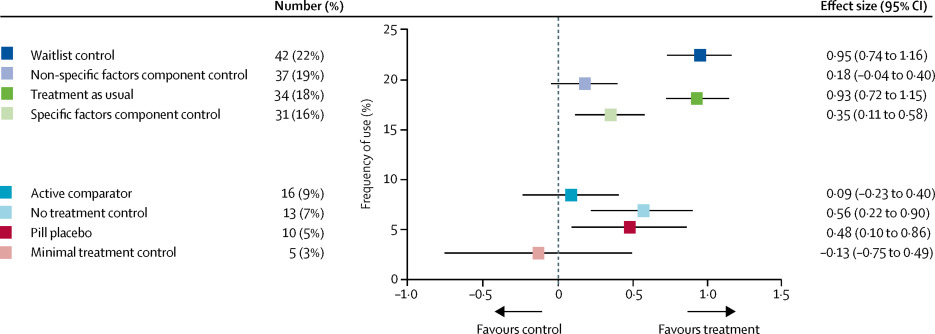Our official English website, www.x-mol.net, welcomes your feedback! (Note: you will need to create a separate account there.)
Control conditions for randomised trials of behavioural interventions in psychiatry: a decision framework.
The Lancet ( IF 168.9 ) Pub Date : 2017-Sep-01 , DOI: 10.1016/s2215-0366(17)30153-0 Stefan M Gold , Paul Enck , Helge Hasselmann , Tim Friede , Ulrich Hegerl , David C Mohr , Christian Otte
The Lancet ( IF 168.9 ) Pub Date : 2017-Sep-01 , DOI: 10.1016/s2215-0366(17)30153-0 Stefan M Gold , Paul Enck , Helge Hasselmann , Tim Friede , Ulrich Hegerl , David C Mohr , Christian Otte

|
In psychiatry, comparative analyses of therapeutic options and the aggregation of data from clinical trials across different therapeutic approaches play an important role in clinical decision making, treatment guidelines, and health policy. This approach assumes that trials of pharmacological and behavioural therapies generally produce the same level of evidence when properly designed. However, trial design for behavioural interventions has some unique characteristics and control groups vary widely, which influence the effects observed in any given trial. In this Personal View, we review various control conditions typically used in psychiatry, outline their effect on the internal validity and expected effect size of a trial, and propose a decision framework for choosing a control condition depending on the risk to the patient population and the stage of development of the therapeutic intervention. We argue that the choice of control group and its justification need to be taken into consideration when comparing behavioural and pharmacological therapies.
中文翻译:

精神病学行为干预随机试验的控制条件:决策框架。
在精神病学中,治疗选择的比较分析以及跨不同治疗方法的临床试验数据的汇总在临床决策,治疗指南和健康政策中起着重要作用。这种方法假定,经过适当设计,药理和行为疗法的试验通常会产生相同水平的证据。但是,行为干预的试验设计具有一些独特的特征,对照组差异很大,这会影响在任何给定试验中观察到的效果。在此“个人观点”中,我们回顾了精神病学中通常使用的各种控制条件,概述了它们对试验的内部有效性和预期效果的影响,并提出用于根据对患者人群的风险和治疗干预措施发展阶段选择控制条件的决策框架。我们认为,在比较行为疗法和药物疗法时,应考虑对照组的选择及其合理性。
更新日期:2017-09-07
中文翻译:

精神病学行为干预随机试验的控制条件:决策框架。
在精神病学中,治疗选择的比较分析以及跨不同治疗方法的临床试验数据的汇总在临床决策,治疗指南和健康政策中起着重要作用。这种方法假定,经过适当设计,药理和行为疗法的试验通常会产生相同水平的证据。但是,行为干预的试验设计具有一些独特的特征,对照组差异很大,这会影响在任何给定试验中观察到的效果。在此“个人观点”中,我们回顾了精神病学中通常使用的各种控制条件,概述了它们对试验的内部有效性和预期效果的影响,并提出用于根据对患者人群的风险和治疗干预措施发展阶段选择控制条件的决策框架。我们认为,在比较行为疗法和药物疗法时,应考虑对照组的选择及其合理性。



























 京公网安备 11010802027423号
京公网安备 11010802027423号